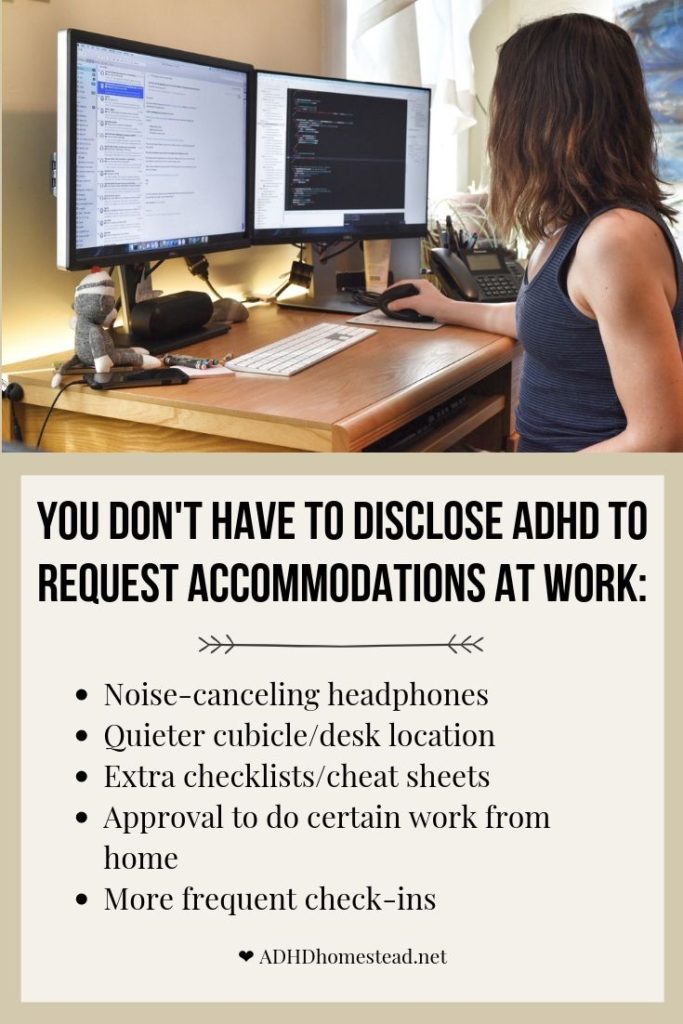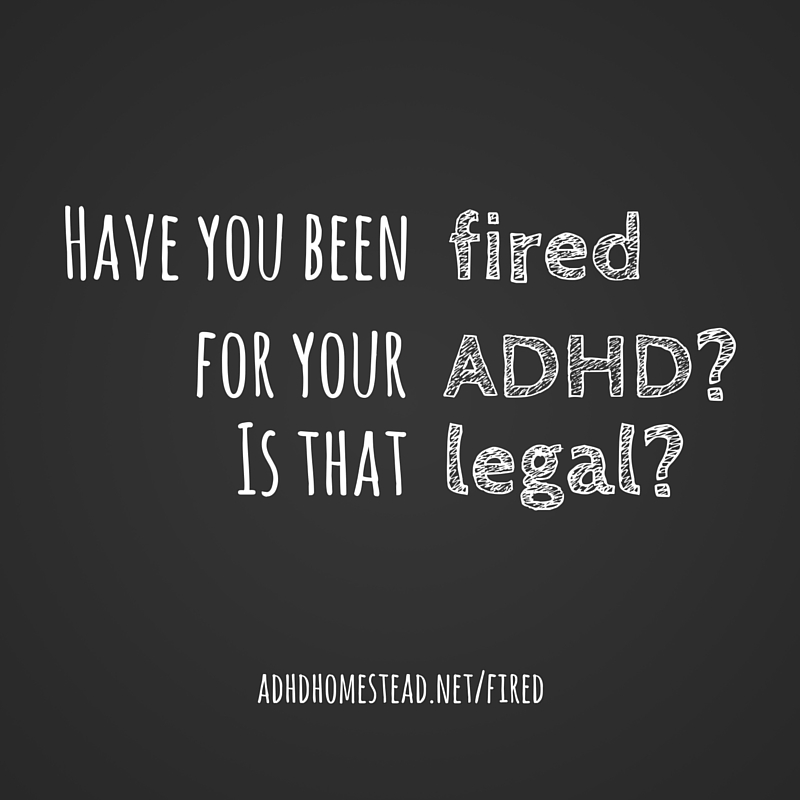If ADHD has ever cost you a job — or if it’s about to cost you one — you may feel like your employer fired you for having ADHD. That’s illegal, right?
Well, yes and no.
Wrongful termination suits are inherently complicated, and perhaps more so for adults with ADHD. Yes, the Americans with Disabilities Act (ADA) can protect people with ADHD. And no, an employer can’t discriminate against you because of your diagnosis.
However, the ADA doesn’t always cover ADHD. The burden of proof is on you to:
- Disclose your condition to your employer
AND - Demonstrate impairments rising to the level of an ADA disability
You can request reasonable accommodations, but you also need to be able to perform the essential functions of your job without them.
To get a clearer picture, let’s make sure we understand those three key phrases: reasonable accommodations, essential functions, and disability.
Disclaimer: I’m a blogger, captain, not a lawyer! This article is based on my own research and my experience as a human resources manager. If you’re dealing with a serious employment issue, use this only as a starting point for getting qualified legal help. A blog post should never be used as honest-to-goodness legal advice.

What counts as a disability under the ADA?
The ADA doesn’t have a list of qualifying mental conditions and disorders, just a loose guideline. You have a disability if your ADHD “substantially limits” a major life activity compared to the general population. A few examples of major life activities: interacting with others, concentrating, working, learning, reading, or communicating. If you can prove you have substantial limitations compared to your neurotypical coworkers, then you have a disability.
However, every case of ADHD and every job is different. At age 16, I got my ideal job in a bustling copy center. Most people quit within two weeks. I thrived for the same reason many ADHD’ers thrive as emergency room doctors: I loved operating in a perpetual state of crisis.
Did I have a disability at that job? Nope. Years later, working in a self-directed administrative job, my ADHD became too much to bear. I eventually phoned our Employee Assistance Program and started stimulant medication. It all depends on your brain, your job, and how the two interact.
If your situation does qualify you for ADA protection, you’re entitled to request reasonable accommodations from your employer.
What are reasonable accommodations?
On-the-job accommodations can include:
- noise-canceling headphones
- higher cubicle walls to reduce visual distractions
- extra checklists and cheat sheets
- authorization to work from home under certain circumstances
You can get as creative as you want, as long as your requests remain reasonable. “Reasonable” in this case means they don’t cause undue hardship for your employer. Some requests may be cost prohibitive or otherwise infeasible.
However, these measures are intended to reduce distractions that keep you from working. They won’t enable you to do a job you’re otherwise unsuited for. You still need to be able to perform the essential functions of your job — with or without accommodations.
What are essential functions?
Having a disability doesn’t entitle you to any job you want. Reasonable accommodations can level the playing field, but you also need to find a job that fits you and your ADHD self.
Essential functions are the basic things you must do in a job — in other words, the reason that job exists.
For example: at a job managing office IT, I had to know basic computer repair and server maintenance. People loved to ambush me at the coffee station to ask about computer troubles. Unfortunately, I forgot any issues reported to me verbally. I told my boss we needed a new policy: submit trouble tickets to me in writing or they don’t count. And I was within my rights to do so. My employer had hired me for my IT skills, not my memory.
In contrast, an executive assistant’s job exists to keep another person organized. They may need to communicate on their boss’s behalf and manage an overwhelming email inbox and calendar. An overlooked detail, social misstep, or time management failure could be catastrophic. A person with ADHD who struggled in those areas would not be well suited to that job even with accommodations.
Can you make a case for wrongful termination?
Wrongful termination for ADHD requires a perfect storm of circumstances. Before pointing any fingers, ask yourself:
- Does your ADHD qualify as a disability according to the above definition?
- Did you officially disclose your ADHD to your employer? Did they document it in your personnel file?
- Have you requested reasonable accommodations? Have you and your employer documented these accommodations in writing? (Saved emails count.)
- Even without reasonable accommodations, are you qualified to perform the essential functions of your job?
A true wrongful termination case for ADHD is rare, and the downsides of officially disclosing your diagnosis often outweigh the benefits. Many people choose to request as many accommodations as possible without ever saying the term “ADHD.” As a human resources manager, I gladly honored any request I could from employees who wanted to improve their productivity. It cost me nothing to locate someone’s desk in the corner of an open-plan office rather than by the door or the photocopier. Yet it could’ve made the difference between success and failure for that employee.

Some tips for the future
Losing a job pretty much always feels terrible. Rather than suffering in vain, try to use what you’ve learned to make your next job more successful. Some things to remember:
- If medication helps you manage your symptoms on the job, take it — and take it consistently
- Weigh your decision to disclose your ADHD to an employer. It may serve you better to ask for accommodations without using the official language. For example, “I work better when I cut out background noise — may I wear headphones at my desk?”
- Set yourself up for success. Find a job you like. One that allows you to capitalize on your strengths. Avoid jobs that place heavy demands on your weak points.
- Document, document, document. If you find yourself in an uncomfortable situation again, start being proactive right away. Save emails, save notes from meetings with your supervisor, and if you want a record of something that was said to you informally, ask for it in an email.
What have you done to prevent your ADHD from costing you your job? Have you ever been fired? How do you think your ADHD impacted your employer’s decision to let you go?
Editor’s note: this post was updated on May 20, 2019.
Hey there! Are you enjoying The ADHD Homestead?
Here's the thing: I don't like ads. I don't want to sell your attention to an advertising service run by the world's biggest data mining company. I also value my integrity and my readers' trust above all, which means I accept very few sponsorships/partnerships.
So I'm asking for your support directly. For the cost of one cup of coffee, you can help keep this site unbiased and ad-free.
Below you will find two buttons. The first lets you join our crew of Patreon pals and pledge monthly support for my work. Patrons also have access to my Audioblogs podcast. The second takes you to a simple donation page to pledge one-time or recurring support for The ADHD Homestead, no frills, no strings. Do whichever feels best for you!


